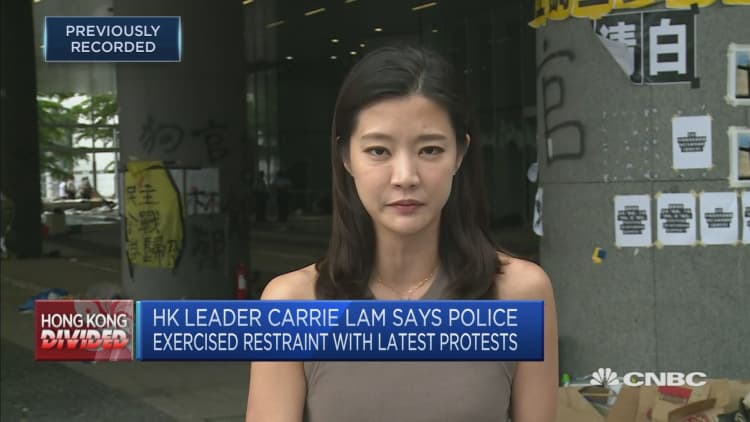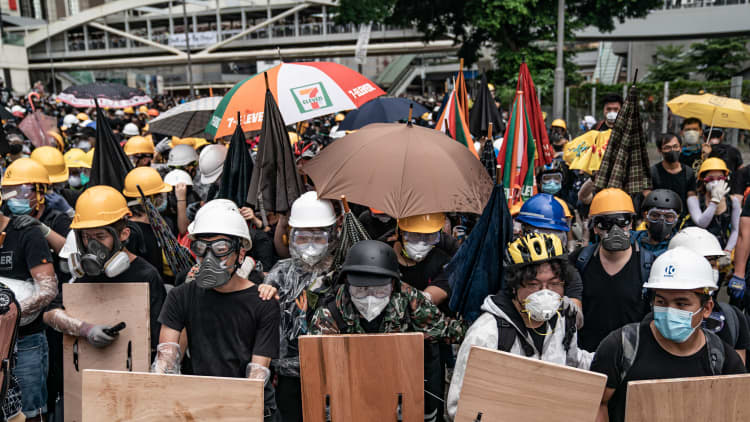
One day after angry protesters stormed and vandalized Hong Kong's legislature amid anger over a proposed extradition bill, the exterior of the building appeared calm on Tuesday.
Monday marked the 22nd anniversary of the former colony's handover from Britain to China on July 1, 1997.
About half a million protesters took to the streets on Monday in a mostly peaceful rally from Causeway Bay to Central in downtown Hong Kong. But this year's protests were marred by anger over a now-suspended bill that would pave the way for suspected criminals to be extradited to mainland China for trial.
A group of protesters turned violent, smashing windows of the city's government building and leaving its walls covered in graffiti. Some entered the building by force and turned the offices upside down.
Hong Kong police used tear gas, pepper spray and batons to disperse the crowds, riling the protesters further.
Still, the majority of the protesters were not violent. They called on the Hong Kong administration to completely retract the controversial extradition bill, and asked its Chief Executive Carrie Lam to step down. They also demanded those arrested at a previous rally on June 12 to be released.
Beijing condemned the attacks on the legislature, calling the protesters "extremely radical."
" These serious illegal acts tramples Hong Kong's rule and law, damages Hong Kong's social order and fundamental benefits. It is an open challenge to the bottom line of 'one country, two systems.' We strong condemn it," according to a statement from Chinese state agency, the Hong Kong and Macao Affairs Office on Tuesday.
It said the central government supported the city's administration and will ensure violent offenders are held accountable for their behavior.
The Hong Kong General Chamber of Commerce also condemned the violence.
"We have to respect and uphold the rule of law," said HKGCC Chairman Aron Harilela. "We fully respect freedom of expression and hope that calm can be restored by resolving differences through rational dialogue and constructive engagement."
Every year since the handover in 1997, hundreds and thousands of people would march the streets to demand democracy and autonomy — but Monday's numbers were estimated to have been about ten times more than last year's.
Anson Chan, Hong Kong's former chief secretary, criticized Lam for the way she handled the situation.
"So far, the chief executive, other than a half-hearted apology has not receded to any of the demands," Chan told CNBC on Tuesday. "Particularly, the complete withdrawal of the extradition bill."
The anti-extradition bill protest was about maintenance of the status quo ... By contrast, the protesters now are asking for change to the political system, for a change of leader.Eleanor OlcottChina policy analyst at TS Lombard
Chan said the priority right now for Lam, Hong Kong's top official, should be the complete withdrawal of the extradition bill. She added if Lam doesn't find a way to satisfy the protesters with the full withdrawal of the bill, Lam will find it increasingly difficult to govern Hong Kong throughout the rest of her term.
In a televised speech on June 12, Lam angered many when she referred to the mass demonstration against the extradition bill as an "organized riot." Chan said the Hong Kong leader should retract those comments, and proposed that an independent commission of inquiry should be set up to look into the violence between the police and the protesters.
The priority right now should be to learn from the situation and prevent any recurrence of "this sort of violent clashes between the police and the protesters and to restore much needed trust between the police and the protesters," Chan added.
Demanding change
In the meantime, the Pan-democratic legislators, together with rally organizers Civil Human Rights Front, were disappointed when Lam rejected their request to meet on Tuesday morning.
"We cannot be angrier at her rejection to the request, which proves her 'willingness to listen' to be the ugliest political lie," they said in a joint statement. "Lam's arrogance revealed by her public responses since June 9 have only poured fuel to the flame, and lead to the crisis today."

However, some experts such as Lowy institute's Ben Bland, say pro-Beijing or pro-police protesters also have "a legitimate viewpoint."
"They have every right to protest in support of the powers that be," said Bland, director of the Southeast Asia Project at Lowy.
"There is a significant bloc of Hong Kongers who support the Chinese government and want to see the city integrate into the rest of the nation," he added. But further violence will not be good for "public perceptions," he added.
Some people are now using this as an opportunity to push for political change, said Eleanor Olcott, China policy analyst at research firm TS Lombard.
There's now a divergence between the anti-extradition protesters and those trying to harness the spirit of the anti-extradition movement to push for political change, she said.
"The anti-extradition bill protest was about maintenance of the status quo," Olcott told CNBC in an email. "By contrast, the protesters now are asking for change to the political system, for a change of leader."
– CNBC's Vivan Kam and Huileng Tan contributed to this report.


